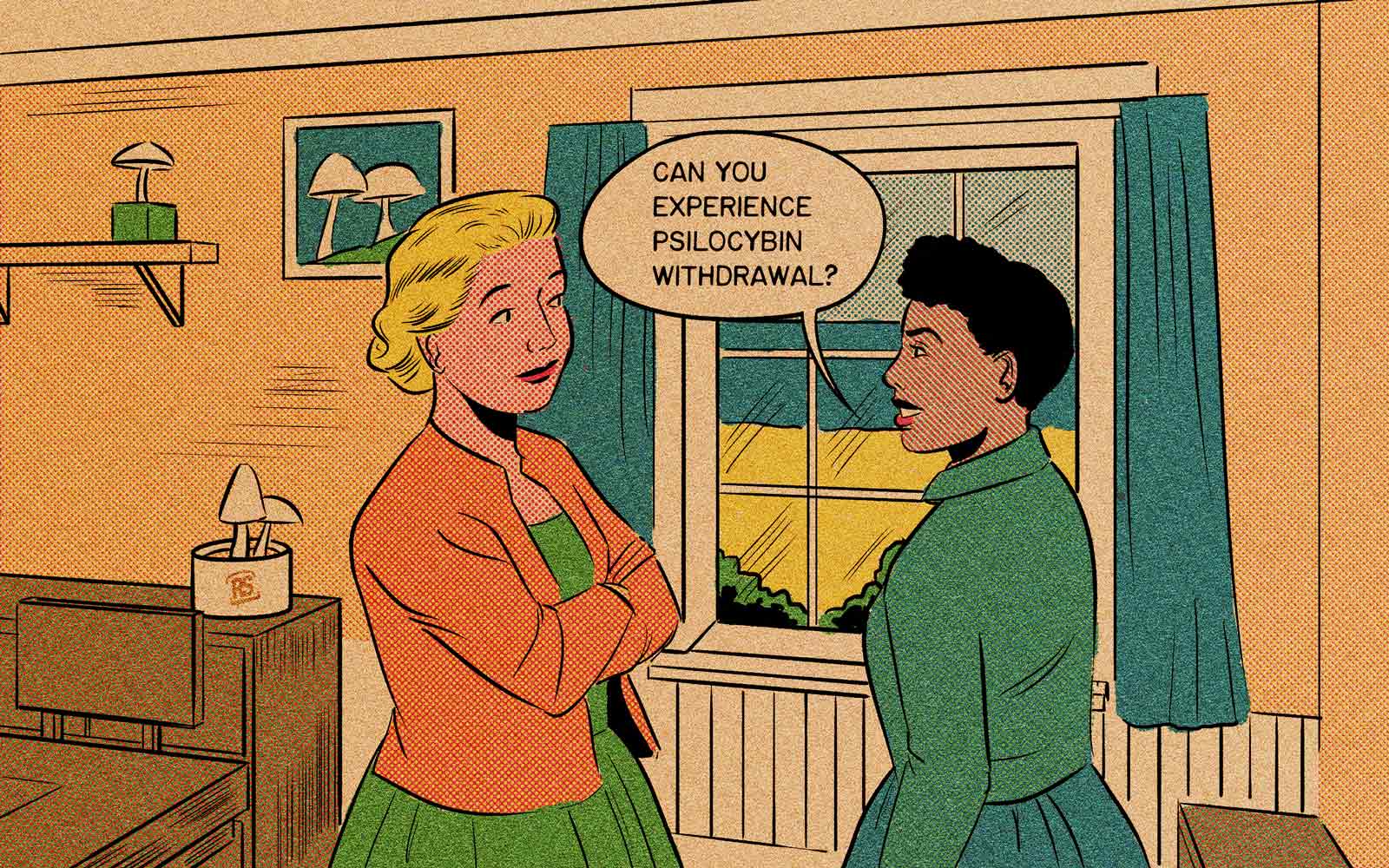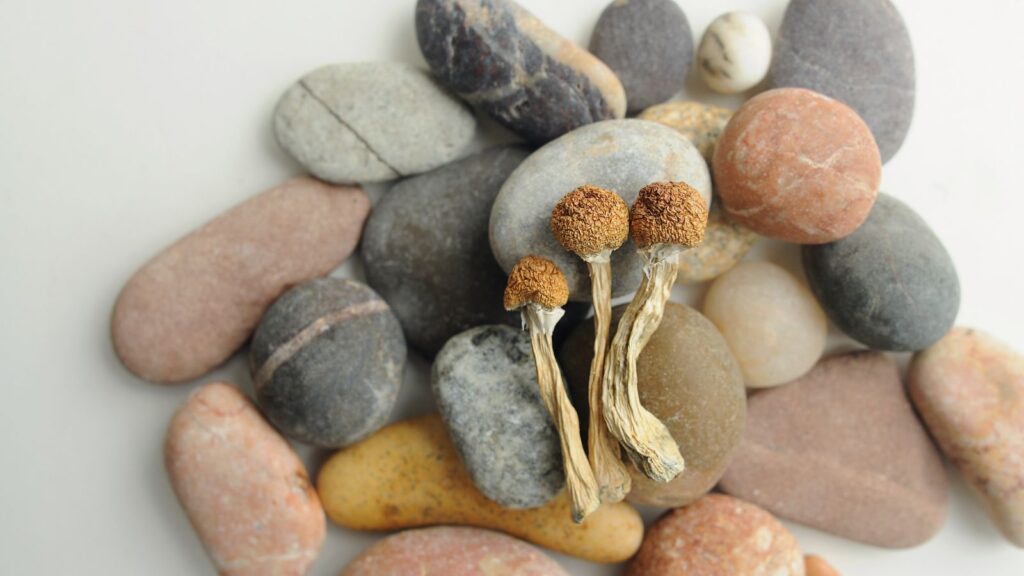We all know that any drug taken for a long period of time causes some type of withdrawal. Of course, the severity of the withdrawal depends on many factors like the dosage, length of use and tolerance. Withdrawal is both a psychological and biochemical experience that happens when an individual stops using a substance ‘cold turkey’. The extremities of the withdrawal can last anywhere from a few hours to a few weeks. So, is it possible to experience withdrawal from psilocybin? Since mushrooms aren’t addictive, it seems the likelihood of psilocybin withdrawal is far beyond reach. However, since microdosing is now a popular alternative for some pharmaceuticals, can a daily small dose of psilocybin intake cause withdrawals? Let’s find out.
What Is Psilocybin?
Psilocybin — known as ‘magic mushrooms’ — is a psychoactive compound found in numerous species of hallucinogenic mushrooms. When consumed at a high dose, psilocybin alters perception, expands the mind and increases self-awareness. With over 180 known species of mushrooms, it’s said to be one of the most spiritual, medicinal and therapeutical drugs commonly available. The magical mushroom is known to influence existing neurotransmitters in the brain, at a heightened level, and when ingested creates a profound psychedelic experience that lasts up to 5-7 hours. Psilocybin is prohibited in most countries, however, in some, it is legal to grow, possess and sell. With its inherent benefits to help those suffering from PTSD, anxiety and depression, psilocybin is on track to be legalized in most, if not all, countries in the near future.
How Do Magic Mushrooms Affect the Brain?
Psilocybin mushrooms have generated magical and sacred experiences for countless beings over millions of years. Many have reported feeling a higher level of euphoria and feeling of connectedness to themselves and the world around them after just one experience. These feelings have reduced depression and anxiety in some people and treated mood ailments like OCD and PTSD, as well as substance use disorders. While we all know that hallucinogenic drugs respond differently to each person depending on their physical and psychological environment, it’s very common for most to experience a sense of renewal and vitalization.
When ingested, the gut converts psilocybin into another chemical, known as ‘psilocin’, the brain activity then increases and binds the serotonin receptors (named 2A), creating what some experts call “neuronal avalanching”. According to Scholarpedia, a neuronal avalanche is a cascade of bursts of activity in neuronal networks whose size distribution can be approximated by a power law, as in critical sandpile models.
It has been reported that emotions and brain function are altered up to one month after just a single dose of psilocybin. The visual cortex increases activity in the brain creating a domino effect of changes leading to enhanced perception, and decreased brain activity, which many have called “ego death”.
Why Do Withdrawals Happen?
Withdrawals happen when a drug is abruptly stopped or reduced. When a person is physically addicted or dependent on a drug, their brain chemistry changes drastically and the body no longer knows how to operate normally without it. Symptoms vary depending on the severity and duration, however, common symptoms are sweating, goosebumps, vomiting, anxiety, insomnia and muscle aches. Severe cases can be life-threatening for those who attempt to withdraw on their own without any medical supervision.
The withdrawal can be very unpleasant as the body is trying to eliminate, adjust and maintain internal stability on its own without the drug. It’s been advised by many medical professionals to decrease dosages slowly to make the withdrawals less brutal.
The Wellness Retreat Recovery Center states, “The confines of a treatment facility keep alcohol and drugs out of the patient’s reach. These factors emphasize why detoxing in a professional setting is necessary for the patient’s best chance at detox and recovery. Suffering through withdrawals alone at home, surrounded by people who may feed the addiction just to make the symptoms go away, is no way to recover. The fact of the matter is, any patient undergoing detox without substance abuse treatment has a higher chance of relapsing, hurting themselves, and succumbing to major health complications that may result in death.”
Thankfully, there are great resources to help minimize the effects of withdrawals. However, withdrawals do happen. So it is encouraged to speak with a professional before abruptly stopping any substance.
Can You Experience Psilocybin Withdrawal?
Since microdosing is relatively new, its long-term use is still being examined and studied. Psilocybin does not lead to dependency, so to become physiologically reliant on it is far out of reach. However, some pharmaceuticals — antidepressants, SSRIs and benzodiazepines — are now being replaced with a healthier alternative: psilocybin. Of course, the duration of psilocybin use can vary since some folks get the most out of their microdosing experience after just a few weeks. Still, the likelihood of experiencing a horrendous, or even a slightly uncomfortable withdrawal is very negligible. If perhaps, a withdrawal does occur, it’ll be very minuscule — similar to a coffee withdrawal.
Microdosing analysis and research have been significantly growing due to its popularity through mainstream media and public interests. While there is still immense research that needs to be done, psilocybin enthusiasts can rest assured that side effects, withdrawals or any negative effect are unlikely to occur.
So, what do you think? Can withdrawals from psilocybin happen? Let us know in the comment section below, we want to hear from you!











